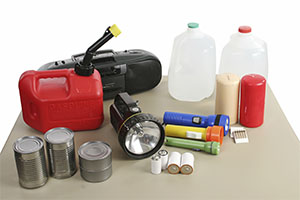Click here to get a quote for Homeowner Insurance
Stock supplies: What would happen if you were without food, water, or power for more than a few hours? A basic emergency preparedness kit should contain enough supplies to get you and your family through these conditions for at least 72 hours or until help arrives. In addition to food, water, and clothing, the Federal Emergency Management Agency (FEMA) advises setting aside matches, prescription medication, pet food and other items in order to be fully prepared. For a complete list of recommended items, visit www.fema.gov.
 Make a family plan: In a crisis situation, how will you locate family members, communicate, and be sure everyone is safe? Younger children, especially, should be taught who to contact and where to go in case of emergency. Select one family member to be the primary contact so that everyone gets correct information. Consider having a set meeting place in case digital communication isn't possible. Finally, make sure all family members have a list of important numbers and addresses to carry at all times.
Make a family plan: In a crisis situation, how will you locate family members, communicate, and be sure everyone is safe? Younger children, especially, should be taught who to contact and where to go in case of emergency. Select one family member to be the primary contact so that everyone gets correct information. Consider having a set meeting place in case digital communication isn't possible. Finally, make sure all family members have a list of important numbers and addresses to carry at all times.
Practice: Silly as they may seem, there's a reason public schools do fire and earthquake drills, because when the real thing happens, panic may get in the way of taking the best action. So it's important to review the elements of your family safety plan and physically practice them if possible. Run through the steps of responding to an earthquake, getting out of the house if there's a fire, or evacuating the neighborhood.
Brush up on first aid: Not only should you have a well-stocked first aid kit handy, but it's also a good idea to stay current on CPR and basic first aid procedures. Check with your local Red Cross to find out when you can take a refresher course or get certified for the first time. In a disaster scenario, these basic skills may mean the difference between life and death.
Stay connected: If you have a smartphone, it's likely that your device is already receiving free Wireless Emergency Alerts (such as Amber alerts or severe weather warnings). There are also apps available from the Red Cross and other agencies that will help you to stay updated in emergency situations. Some can even help you to locate or communicate with specific people with the push of a button. Be sure to program all family members' phones with an emergency contact a standard feature on most devices these days.
Go to www.ready.gov to find more tools and tips for emergency preparedness.
For more information about home insurance, call or contact Litaker Insurance today.
